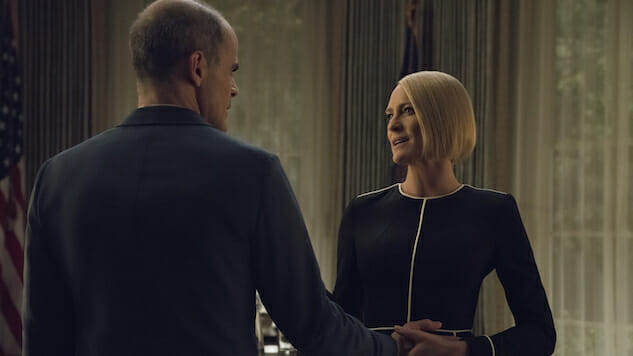Netflix Has a Drama Problem
Photo: David Giesbrecht/Netflix
Editor’s note: The following contains spoilers from the final season of House of Cards
In “Chapter 71” of Netflix’s first original series, House of Cards, President Claire Underwood (Robin Wright) meets her late husband’s right hand, Doug Stamper (Michael Kelly), in the Oval Office, and proceeds to explain her new stranglehold on power. The details are immaterial—creator Beau Willimon’s American spin on the fourth wall-breaking BBC miniseries has been on the decline since Kate Mara “fell” in front of that train—but the scene’s emphases and ellipses are nonetheless telling: Into the leads’ usual sniping and jousting, “Chapter 71” shoehorns the assassinations of two of the series’ most fascinating figures—Patricia Clarkson’s enigmatic, strangely intimate powerbroker, Jane Davis, and Jayne Atkinson’s stalwart Secretary of State, Catherine Durant—and the journalist Tom Hammerschmidt (Boris McGiver), an enduring thorn in the Underwoods’ side. It’s an idiosyncratic choice, killing off what remains of your supporting cast with two episodes left, but of course this is Netflix, the medium’s most effective manipulator of the sunk-cost fallacy. The consequence is a two-hour denouement that counts among the most dreadful miscalculations of the year in television, so dully committed to its final confrontation that it loses all sense in the process. I endured the series’ conclusion as if I had a letter opener pressed to my jugular, dreaming of ordering a commemorative T-shirt: I SPENT 73 HOURS OF MY LIFE WATCHING HOUSE OF CARDS AND ALL I GOT WAS THIS SHITTY ENDING.
With the streaming giant’s first wave of flagship originals nearing its own denouement—following House of Cards, both Tina Fey and Robert Carlock’s Unbreakable Kimmy Schmidt, which never managed to evolve past its intriguing premise, and Jenji Kohan’s Orange Is the New Black, which has soured in recent seasons, are set to end in 2019—now is an apt time to reconsider Netflix’s place in the TV ecosystem, and the truth, perhaps surprisingly, hurts. Though its viewership numbers remain the most frustrating secret in the business, the platform often seems to dominate the cultural conversation (see, most recently, The Haunting of Hill House), and the volume and cost of its original programming is more on par with that of a multi-channel media conglomerate than a single TV network. (In February, Netflix CFO David Wells estimated that 700 original series would be available on the service worldwide this year, along with more than 80 original movies, at a price of more than $8 billion.) The streamer has poached Shonda Rhimes and Kenya Barris from ABC, and Ryan Murphy from FX; it’s brought foreign-language series to English-speaking audiences at an unprecedented rate; it has a deep bench of original comedies with subjects ranging from women’s wrestling (GLOW) and race on campus (Dear White People) to adolescence itself (American Vandal, Big Mouth), including the tragicomic masterpiece that is BoJack Horseman. Still, there remains a gaping hole in Netflix’s resume, one that can no longer be explained away as a consequence of its inexperience with scripted originals: More than five years after the debut of House of Cards, the most powerful entity in television has yet to produce a truly great drama.
-

-

-

-

-

-

-

-

-

-

-

-

-

-

-

-

-

-

-

-

-

-

-

-

-

-

-

-

-

-

-

-

-

-

-

-

-

-

-

-








































